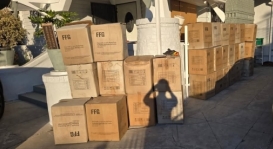On Nov. 30, the Southern Baptist Convention launched the weeklong 2003 International Missions Emphasis to boost congregational and individual offerings to the board. The International Mission Board – SBC’s wing for foreign missions, relies on the Lottie Moon Christmas Offering for half of its annual financial support.
To supplement the $133 million offering challenge, the Baptist Press – SBC’s media wing – began releasing a special series on international missions fields, new and old, to supplement the missions emphasis, entitled, “That All Peoples May Know Him: Follow God’s Purpose.”
The Dec. 8th emphasis was placed on the missions in Sumatra Indonesia, where the 220 million people make up the largest Muslim nation in the world.
"There are only so many things you can get your mind around," said an IMB missionary who called himself “Calvin Walters” for security reasons. "I thought Indonesia was made up of Indonesians. Trying to think of evangelizing 220 million people -- that's overwhelming.
"I quickly learned of the spectrum of the country," he said. "There are different people groups with different values and beliefs. You can't learn about 'Indonesian' culture. What slice do you want to look at?
Walters decided to narrow his field of focus so that his impact could be stronger. Walters therefore committed himself to the church planting movement among the Lampungese – an unreached people group of 2 million.
The Lampungese is among the 52 known unreached people groups in the island of Sumatra. Of these, 48 have no indigenous churches and 34 of them have no known Gospel workers. Therefore, according to Scott Holste, director of the IMB’s global research department,, the ministries must not be generalized by nation, but be individualized to the many peoples within the states.
"There was a time when we could mark initial progress in this task [of world evangelism] by keeping track of and learning about the countries in which we had missionaries," Holste says.
"We have learned, however, that reality is much more complex than that," he says. "Virtually every country in the world contains scores, if not hundreds, of diverse people groups. We can no longer be satisfied that we have made disciples and established the church in one or two people groups in a country."
The Lampungese are just one of the people groups who have not heard the gospel. Therefore, many more workers are needed to spread the good news.
"The Lampungese are not Christian because they haven't heard the Gospel," said Walters. "What is keeping the rest of the Christian world out? We need more laborers for the harvest [but] it seems that just not enough people care."







